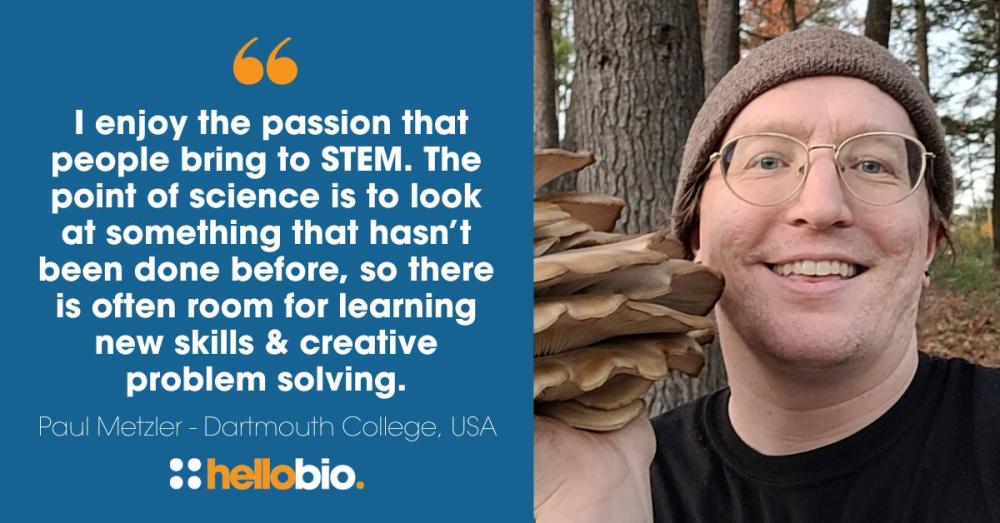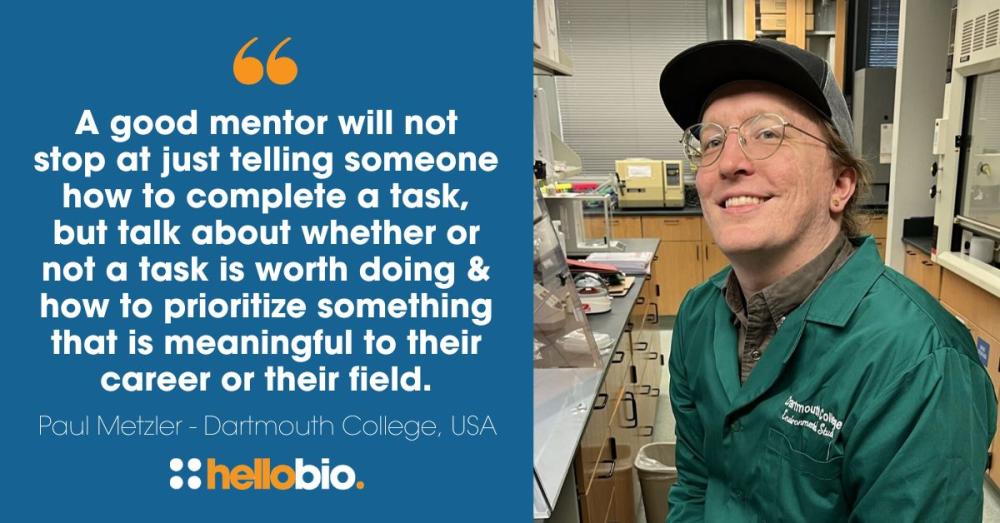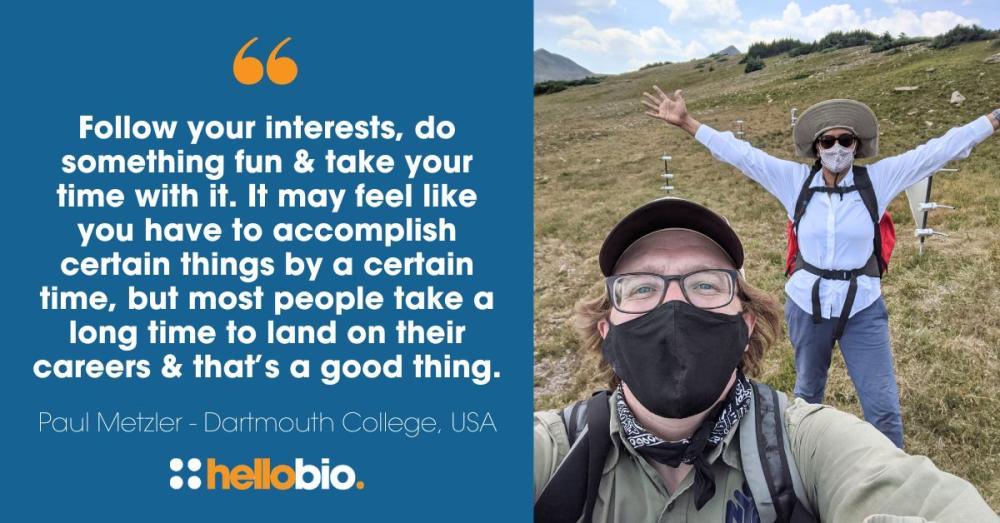Meet Our Lab Heroes Awards™ 2023 Winners: Paul Metzler
It’s time to meet another of our Lab Heroes Awards™ 2023 winners!
Paul Metzler is an experienced lab manager at Dartmouth College, USA, whose willingness to go ‘above and beyond’ secured him the top prize in this year’s ‘Lab Supporter’ category. Our judges were touched by his dedication to mentoring, and the impact he has had on the students who work alongside him.
Paul manages all technical operations of soil ecology research in the Chaudhary Lab and oversees field experiment operations as NEON liaison. He earned a MSc in forest biology from the University of Alberta and published research on the belowground molecular identification of boreal forest plants. He has worked for land management agencies, conservation groups, and academic institutions in Oregon, New Mexico, the Canadian boreal forest, and Chicago, and his particular areas of interest include the Alberta Oil Sands region, biological soil crusts, native seed collections, and plant-fungus mutualisms.
As part of the Lab Heroes prize winning package, Paul will receive $1,000 of Hello Bio vouchers and $1,000 to spend on his own career development. We spoke to him about his career so far, the challenges facing life scientists today, and the qualities needed to become a good mentor…
Congratulations, Paul! How did it feel when you found out that your colleague had nominated you as their Lab Hero?
I was surprised to learn that my lab had conspired to nominate me for this award. That they had taken the time to write such a thoughtful nomination was heartwarming, especially as it emphasized how much they valued my favorite part of my job: helping people learn, grow, and feel welcome in the lab space.
Why do you think it’s important to celebrate life science researchers, and what more could be done to show life scientists recognition?
I am glad that Hello Bio included a support category as it gave me a chance to think about all the people in support roles who have helped me along the way, from other lab managers who taught me everything I know, to the technicians who power through the most boring tasks, to the indomitable administrative staff who can make anything happen, to the custodial staff who take out the trash and talk to me when I’ve stayed too late in the building. I think it is good to celebrate brilliant scientists who are doing interesting work, but there is no limit to our ability to celebrate and show recognition for people and I think it is important to appreciate the teams of people at all levels that make interesting science happen.
What are you planning to use your Hello Bio vouchers and career development grant for?
I am planning to use these awards to support cool projects and to share our lab’s research at a conference. I want to pay forward as much of this award as possible.
What do you enjoy most about working in STEM?
I enjoy the passion that people often bring to STEM. In our mycorrhizal ecology lab, that often comes with love for the outdoors and an interest in the strange lives of fungi and I like having the tools to be able to explore that passion further. Because the point of science is to look at something that hasn’t been done before, there is often room for learning new skills and for creative problem solving which I find very fulfilling.
Did you always want to be a scientist when you were younger, and if so, why?
I was always interested in learning more about things that were different from me or from the world I grew up in. That could mean learning about the mysteries of space, interpreting abstract art or poetry, eating strange (to me) foods, or learning about what lives deep in the ocean (seriously, what’s down there?). When it came time for me to choose a major, I felt very unfocused as I was deciding between being a scientist and being a writer, two very different professions in my mind. Many years later I am still deciding what I want to be when I grow up, though I do admit that science pays my bills and I enjoy the work immensely.
Can you tell us a bit more about what you're working on in the lab at the moment?
My lab focuses on the ecology of mycorrhizal fungi. Right now, I am looking at samples of dust from across the United States in order to assess how fungi move through the air. We use microscopy and DNA-based molecular methods to identify fungal spores and hyphal fragments to better understand the biogeography of these fungi.
What does a typical day in the lab look like for you?
Ecological work is very seasonal and varied so every day is different. Sometimes I can be out in the field collecting samples or repairing equipment. Other times I may be processing samples or preparing their DNA for sequencing. Still other times I may be writing or optimizing code for our bioinformatics pipeline. Usually my day includes some training, supervision, or support of other members in the lab as well as administrative tasks that keep the lab running. The rest of my day usually involves making progress on research through writing, coding, or benchwork.
Your colleague praised your dedication to mentoring - why is this important to you, and which mentors have influenced you most in your own career?
I have been lucky to have worked with mentors who are thoughtful about their positions, who create warm, welcoming environments, and who facilitate the conditions that allow me to learn and take on a leadership role in my work. I really value the trust these people have placed in me, and I like giving people that same level of trust when I can. I will shout out my current PI, Dr. Bala Chaudhary and my master's advisor Dr. Justine Karst who are two of the best mentors anyone could ask for. I have also had great mentors during my positions in land management with the US Army Corps of Engineers, McHenry County Conservation District, and the Chicago Parks District.
What do you think are the most important qualities needed to mentor the next generation of life scientists?
I think that we learn facts very well in school but I think that mentorship goes beyond that by showing people how to take ownership of their work and their mistakes. I think that a good mentor will not stop at just telling someone how to complete a task, but talk about whether or not a task is worth doing and how to prioritize something that is meaningful to their career or their field.
What do you think are the biggest challenges facing life scientists at the moment?
I’ve been lucky to have great supportive mentors and lab groups. But I know that certain lab groups are not that way. Science can be very isolating at any stage if you don’t have a supportive community. There can also be cultures of overworking that form and lead to stress and mental health issues. Furthermore, many science mentees find themselves in a position where one person has disproportionate power over their career development, research funding, and future prospects. These problems can be exacerbated for first generation and international students who may not be able to find support elsewhere or who face other institutional barriers. We need to continue to push for creating supportive and transparent lab groups which have clear paths towards success that involve multiple mentors and support systems.
Another challenge facing life sciences, especially evident in the environmental sciences, is the disparity of access to science between the 'global north' and the 'global south.' A huge amount of resources, environmental monitoring infrastructure, and funding go to institutions based in the US or Europe which not only causes biases in our data (they are biased to the northern and temperate latitudes), but also causes biases in the very questions we ask as scientists (they are biased towards a western perspective). The movement towards co-creating the questions we want to investigate with the communities who live on the land we are studying, gives me a lot of hope because it ensures our science is relevant beyond our small group of colleagues and it can often reallocate resources and power to groups that might otherwise have been excluded from the scientific process.
What key piece of advice would you give to a younger scientist just starting out in their career?
Follow your interests, do something fun, and take your time with it. It may seem like there is a ladder in life sciences and it can feel like you have to accomplish certain things by a certain time, but in fact, most people take a long time to land on their careers and that’s a good thing.
How do you see your career developing in the future/where do you see yourself in 10 years?
In the future I see myself continuing to help out other people in some way. This could be in a leadership or support role. This could even be in a totally different career. I’m not worried since there are always a lot of ways to do what I like to do.
Which scientists do you admire the most?
There is one scientist who has probably changed the way I think about science the most. I met her when I was a camp counselor and she was seven years old. I only knew her by her camp name: sugarplum. I asked her what she wanted to be when she grew up and she said she already was what she wanted to be: an astronomer. She said this without any proof of qualifications, and she produced no degrees, but she was right. She just did what she liked to do and that was how she measured success.
And finally... what’s your favourite science joke?
When folks look tired, I like to sigh and say, “another day in the science mines.” It is one of those rare jokes that gets better every time you say it.
________________________________
Thank you for such a great interview Paul! We look forward to following your career as it continues to progress!
Connect with Paul and the team at the Chaudhary Lab:
- Lab website: https://balachaudhary.com/
- X (Twitter): @apaulmetzler
- X (Twitter): @BalaChaudhary
And you can meet our other Lab Heroes Awards™ 2023 prize-winners here.
________________________________
If you enjoyed this article, why not check out the other resources available on our blog. We are passionate about supporting life scientists including early career life scientists and PhD students - with really low-priced reagents, antibodies and biochemicals, early career scientist grants, and resources to help with both personal and professional development. We know how tough it is - so we hope you find these helpful!
More General Support for Life Scientists
For advice on wellbeing, dissertations, presenting at conferences, wellbeing, PhD support, networking and lots more, we have a huge range of articles to help - just click below:
Save up to 50% on our high purity reagents...
When you get to the stage of planning your experiments, don't forget that we offer a range of low-cost, high-purity agonists, antagonists, inhibitors, activators, antibodies and fluorescent tools (yes - they really are around half the price of other suppliers!) You can use our Quick Multi-Search Tool to search for lots of products in one go, and the range includes:
- Enzyme inhibitors and activators
- Chemogenetic ligands
- Ion channel modulators
- GPCR & ionotropic receptor ligands
- Cell biology reagents & biochemicals
Technical resources
Try our Molarity Calculator: a quick and easy way to calculate the mass, volume or concentration required for making a solution.
Try our Dilution Calculator: an easy way to work out how to dilute stock solutions of known concentrations
We also offer a comprehensive range of technical resources including antibody protocols and methods, product guides and mini-reviews:
And finally, don't forget to check back in with our blog regularly for our latest articles. If there’s something you’d love to contribute to the community, whether that’s an interview or article, drop us a line at hello@hellobio.com
---





















